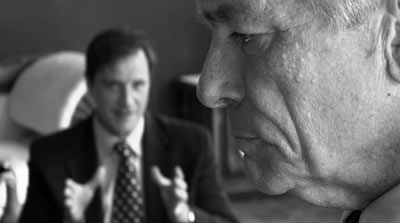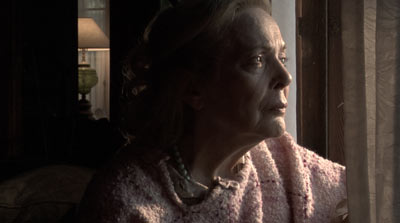
Synopsis
Political Disasters, the first (chronologically) or last (in production order) film of Zach Horton's "Disaster Trilogy", follows two families with dubious ties over the course of five years: 1999-2003. Jim (Tim DeKay), a consummate businessman and expert liar, is enlisted by his employer Michael (Michael Bryan French) to fix his "familial static", caused by his racist, isolated mother (Barbara Bain) and martyr-in-search-of-a-cause daughter (Paulie Rojas). Jim has more than enough on his own familial plate, however, as he spirals into an existential crisis after cheating--on his mistress. As George W. Bush takes the helm of the U.S. Government and the War On Terror invades the airwaves, the domestic disasters pile up faster than you can pull that voting booth lever.
Director's Notes: Feeding the Circuit
I believe that sometimes you have to live an event twice in order to make sense of it, and thereby have any hope of moving forward. The past four years that I've worked on this Disaster Trilogy have been, for me, eerily similar to the four years preceding them; such is the twisted déjà vu logic of attempting to capture the recent past in artistic form. It's a bit like a diabolically delayed circuit: life goes in and film comes out, but meanwhile life is still feeding the circuit, and the whole thing can get pretty messy.
The new millennium wasn't going to go well; we knew that before it even happened. The Y2K Bug was a clear symbol that we, as a species, weren't ready for the future.
As it turned out, civilization didn't collapse on Jan 1, 2000. As far as I could tell, the most significant Y2K Bug bite was felt by my oldest computer, which reset its system date to Jan 1, 1980--three weeks before I was born. I manually set the date to 2000, and it continued to operate normally for another seven years, when it appeared in Natural Disasters as John's workshop computer. Yet even if the bold actions of computer users such as myself had staved off its total collapse, civilization did soon appear to suffer some structural damage. After 9/11, the rise of George W. Bush, the wars in Afghanistan and Iraq, and the resurgence of Evangelical power in the USA, it hardly took Hurricane Katrina (which occurred as I was working on Airplane) to reveal that something was dreadfully wrong with our culture.
Meanwhile, life kept feeding the circuit.
If the Disaster Trilogy attempts to make sense of this period of time (roughly 1999-2005), it does not do so by way of personal narrative or historicism, but some in-between space. It eschews the aesthetics and structures of Hollywood and independent cinema alike. It sends up the phony solemnity of the news media and the sentimentality of popular entertainment. It isn't afraid to look at the events of those years with a bit of irreverence, noting not only their significance, but also their absurdity.
Each of the three films approaches the period in question from a different angle, a different perspective. This is why each film is complete-unto-itself, and yet the trilogy as a whole provides a perspectival frame that is more complete (if still fractured) than any one of its constituent films. Nonetheless, the films are radically different from one another. Natural Disasters is a multi-perspectival chamber drama about subconscious racism, Airplane Disasters is an experimental dual narrative, and Political Disasters is something of a minimalistic epic.
The films share a number of things in common, besides a handful of characters. Each film pretends to be something it's not and conceals its true nature. Each film is suspicious of traditional cinematic approaches to narrative, and perhaps suspicious of narrative itself. Each film melds the mythology of the large-scale disaster with the intimacy of the small-scale drama; any juice that is to be squeezed comes from modulation between these two poles. And, of course, each film is aware of its own absurdity.
 It may come as no surprise that the films can be seen in any order. I made Airplane first, and it is the roughest around the edges. I made Political last, and it is the most “polished”. Seen in this order, some may perceive a formal evolution or decline. In terms of narrative chronology, Political comes first, Natural last; this is as good an order as any. But of course even this isn't as simple as one might wish: events depicted in flashbacks chronologically criss-cross the narratives, and parts of Political were shot before Natural. In the end, one always retains the option of rolling a die, or just watching TV instead.
It may come as no surprise that the films can be seen in any order. I made Airplane first, and it is the roughest around the edges. I made Political last, and it is the most “polished”. Seen in this order, some may perceive a formal evolution or decline. In terms of narrative chronology, Political comes first, Natural last; this is as good an order as any. But of course even this isn't as simple as one might wish: events depicted in flashbacks chronologically criss-cross the narratives, and parts of Political were shot before Natural. In the end, one always retains the option of rolling a die, or just watching TV instead.
Political Disasters is, it seems, either the first or the last film of the trilogy. It serves as a summation, and also an introduction. It is the longest of the films, but also the fastest. Its over-proliferation of narratives may be either the consequence of or prerequisite for the mythical minimalism of the other installments.
I don't know if these films will help you make sense of where we've been and what we are, as they've helped me. Perhaps you will find them funny. Perhaps you will find them painful. I find them both, but that is only natural: life, after all, continues to feed the circuit.






